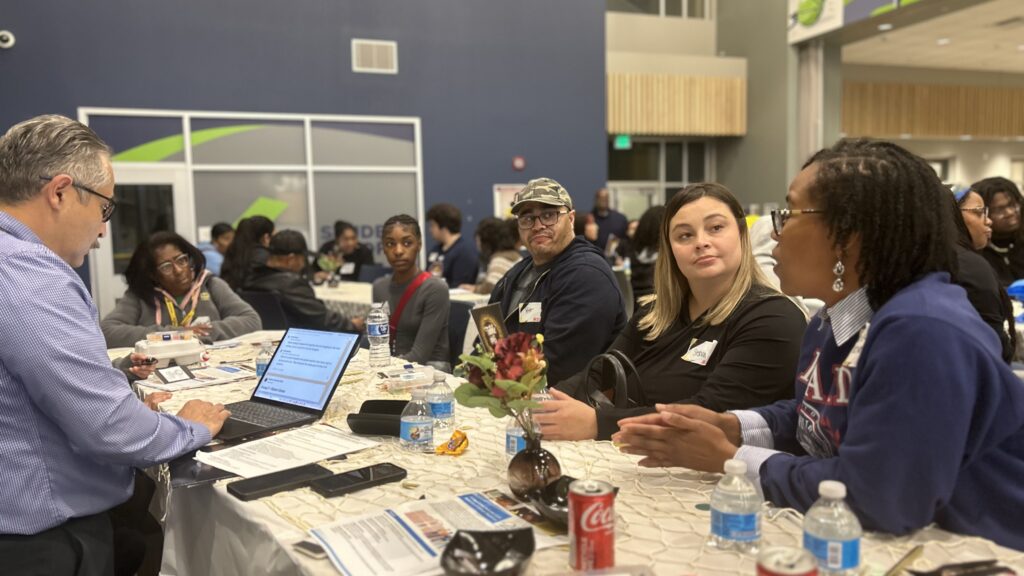Fresno Unified School District leaders, educators, parents and students share feedback about changes to the academic support department for Black and marginalized students during a community forum, Nov. 18, 2025. (EdSource/Lasherica Thornton)

- Fresno Unified was at risk of losing up to $250 million in federal funding if it kept its Black student achievement program in its present state.
- After restructuring, the department will promote initiatives more broadly to the district’s marginalized student groups, whom it has served over the years.
- Some fear that the changes, especially the name change, may shift focus away from equity for Black students.
Share
|
Getting your Trinity Audio player ready...
|
The Trump administration’s threat to cut federal funds to schools with race-based programs and a discrimination lawsuit prompted the Fresno Unified School District to restructure its academic support department for Black students.

Lasherica Thornton
EdSource
Starting with a name change in October, the African American Academic Acceleration department — still known as A4 — is now the Advancing Academic Acceleration & Achievement department.
The district made the name change to avoid losing $250 million in federal funding. The change also shows that the department supports all marginalized racial and ethnic groups, not just African American students, the basis for the lawsuit, district leaders said.
This story was originally published by EdSource. Sign up for their daily newsletter.
“There’s a lot happening at the federal level that we have no control of,” said Lisa Mitchell, executive director of A4. “When we think about the threat and loss of $250 million, not only does it impact the students we’re serving in A4, but it impacts students across our entire district.”
But Eric Payne, executive director of the Central Valley Urban Institute, a policy advocacy organization working in low-income communities, said the name change raises a “dangerous” question about whether equity is a priority for the district.
“Is the name change an attempt to dilute the focus on Black student equity and set a new precedent that makes other culturally responsive programs vulnerable?” he said.
Addressing an Achievement Gap
The history of A4 dates back to 2017, when 79% of Fresno Unified’s Black students failed to meet California’s reading standards, and 86% failed to reach math proficiency, according to the state’s assessment results.
The district responded by creating A4 to focus on the academic underperformance of Black students.
“I think for Black families in this community, that was seen as a win — $4 million investment from the Fresno Unified school board that grew to a $12 million investment,” Payne said.
A4 academic support programs for elementary students were first implemented only during summer and after school, before expanding to year-round services at over a dozen schools with the largest populations of Black, Latino, Afro-Latino, Hmong, Native American and Pacific Islander students. A4 holds workshops for parents to learn how to help their children improve academically. There is an emphasis on providing instructional materials featuring diverse characters that look like students, who often learn about their culture and history from the content.
There were improvements — 35% of students participating in the after-school reading program in the 2023-24 school year improved by at least one grade level, according to the department’s 2024 impact report.
For middle school and high school students, the department offers enrichment camps, peer groups and support programs, which provide academic and social-emotional support.
A Discrimination Lawsuit
In February, the Californians for Equal Rights Foundation filed a discrimination lawsuit on behalf of Fresno Unified families alleging non-Black students were excluded from A4 programs that they were either eligible for or would have benefited from.
A federal judge in August dismissed the complaint, saying the foundation failed to establish key legal standards and made “no factual allegations that the members’ non-African American children were actually denied access to an A4 Office program on the basis of race.”
The foundation has until Wednesday to file an appeal of the dismissal.
“There’s not one student who’s non-marginalized, who’s attempted to join, who’s been turned away,” said Mark Harris, an attorney for the district. “That was true in the past, and I’m sure it’ll be true in the future going forward.”
Still, the lawsuit and the Trump administration’s actions are reasons for the A4 restructuring, district leaders said.
Among the changes, A4 will promote initiatives more broadly, including by combining middle and high school support programs that were named to target African American students into one narrowly focused program, the department said.
Payne, the community leader, expressed fear about what the changes mean for Black students.
“It must preserve the core mission,” Payne said, “which is academic acceleration, social-emotional support and cultural affirmations for Black students.”
How Else Will A4 Change?
The restructuring is also to align better with district literacy and intervention goals, which will make a larger impact, Mitchell said.
A4 has hired and trained teaching fellows, or college students, to provide in-class, small-group targeted intervention for students in grades preK-6. Rather than providing academic and enrichment activities each day, the reading support is happening four days a week, with just one day for cultural enrichment.
Last week, more than 150 community members attended a forum at the Farber Educational Campus to learn about the changes and provide input.
Ava Vargas wanted to ensure that any change keeps kids of different ethnic groups on track with reading and writing. Vargas and her 5-year-old daughter, who is Native American and African American, have received resources to learn at home, preparing her for kindergarten this year.
“With the name change, I was like, ‘What else is going to happen?’ ” Vargas said.
At the community forum, district leaders divided attendees into 18 groups to discuss what else could be done to improve the success of students most in need.
Some of the ideas from the groups included boosting parent engagement and involvement through workshops or boot camps. They also suggested additional social-emotional support for students, more resources for families to use at home, support during students’ transition from K-12 to higher education systems, and for A4 to continue its operations.
Some parents, such as Vargas, said the forum assured them that the A4 mission will remain intact. Many people voiced their desire to help.
Mitchell said she appreciated the turnout, engagement, and support from the community to elevate the department.
“It took a weight off our shoulders because we now have people at the table who want to support,” Mitchell said. “We’ve got a community with us trying to figure this out, too.”
About the Author
Lasherica Thornton covers education in California’s Central Valley. Follow her on X @LashericaT


















